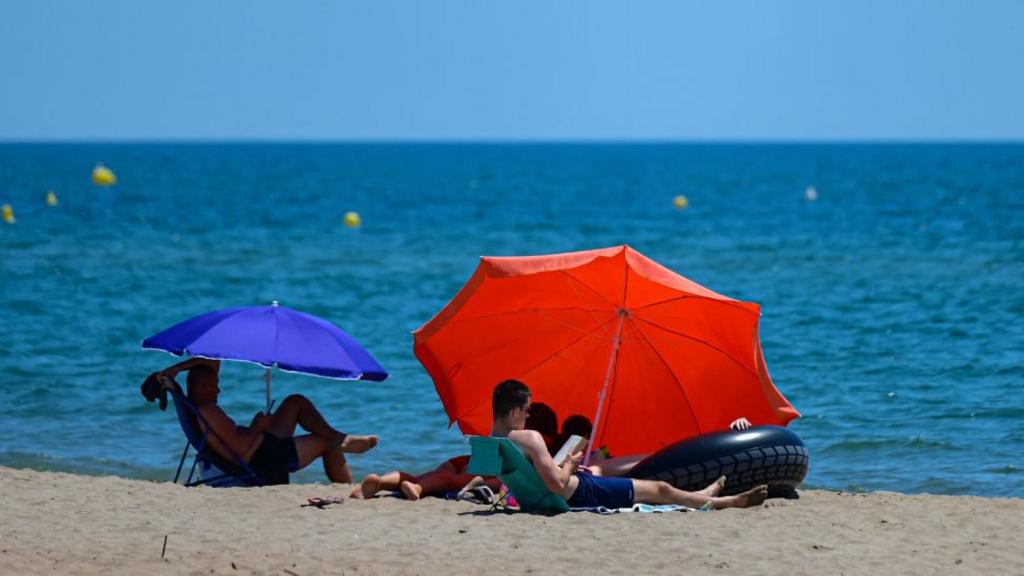“`html
While warmer coastal waters may seem inviting for a swim, a recent marine heatwave in the Mediterranean Sea has reached such intensity that scientists are expressing concerns about potentially devastating consequences for marine life.
In late June and early July, sea surface temperatures regularly exceeded 30C off the coast of Majorca and elsewhere, reaching levels six or seven degrees above the norm in some areas.
This surpasses the typical temperature of many leisure center swimming pools.
This event marks the most extreme marine heatwave ever recorded in the western Mediterranean for this time of year, impacting vast areas of the sea for weeks.
Although the heat appears to be subsiding, some species struggle to endure such prolonged and intense warmth, potentially leading to cascading effects on fish populations.
For context, most leisure center swimming pools are heated to approximately 28C. According to World Aquatics, competitive swimming pools maintain slightly cooler temperatures, ranging from 25-28C.
Children’s pools are typically warmer, with recommended temperatures of 29-31C, or 30-32C for babies, as suggested by the Swimming Teachers’ Association.
These seemingly pleasant temperatures can mask underlying dangers. Harmful bacteria and algae tend to proliferate more readily in warmer seawater, which lacks the chemical treatments found in swimming pools.
Sea temperatures of 30C or higher are not unheard of in the Mediterranean during late summer.
However, such temperatures are highly atypical for June, based on data from the European Copernicus climate service, Mercator Ocean International, and measurements from Spanish ports.
“What distinguishes this year is the earlier arrival of 30C sea temperatures, suggesting a potentially more intense and prolonged summer,” stated Marta Marcos, associate professor at the University of the Balearic Islands in Spain.
“Having grown up here, I’m accustomed to heatwaves, but they’ve become increasingly frequent and intense.”
“We’re all very surprised by the magnitude of this heatwave,” added Aida Alvera-Azcárate, an oceanographer at the University of Liege in Belgium.
“It’s a significant concern, and we anticipate similar occurrences in the future.”
Marine heatwaves are increasing in intensity and duration as human activities continue to release planet-warming gases into the atmosphere, primarily through the combustion of coal, oil, and gas.
Indeed, the number of days experiencing extreme sea surface heat globally has tripled in the last 80 years, according to research published earlier this year.
“Global warming is the primary driver of marine heat waves, essentially transferring heat from the atmosphere to the ocean. It’s a straightforward process,” explained Dr. Marcos.
The Mediterranean is particularly vulnerable due to its basin-like structure, largely surrounded by landmasses rather than open ocean.
This restricts water flow, causing the surface to heat up rapidly under warm air, sunny conditions, and light winds – as observed in June.
Consequently, the Mediterranean is considered “a climate change hotspot,” according to Karina von Schuckmann of Mercator Ocean International, a non-profit research organization.
The heat reached its peak at the transition from June to July, after which stronger winds facilitated the mixing of deeper, cooler waters with the warm surface, leading to a decrease in temperatures.
However, temperatures remain above average, and the long-term consequences for marine life are still uncertain.
Most organisms have a temperature threshold beyond which they cannot survive, although this threshold varies significantly among species and individuals.
Prolonged heat exposure can also weaken marine organisms, depleting their energy reserves throughout the summer to a point where they can no longer cope.
“I recall diving in September four years ago, at the end of summer, and discovering the skeletal remains of numerous populations,” recounted Emma Cebrian, an ecologist at the Centre for Advanced Studies of Blanes in Spain.
Seaweeds and seagrasses function as the “forests” of the Mediterranean Sea, providing habitat for hundreds of species and sequestering planet-warming carbon dioxide.
“While some are well-adapted to typical Mediterranean warm temperatures, they often cannot withstand the increasingly extreme and widespread conditions of marine heatwaves,” explained Dr. Cebrian.
The heat can also induce “sub-lethal effects,” where species enter a survival mode and cease reproduction.
“If we begin to observe ecological impacts, there will almost certainly be consequences for human societies, including losses in fisheries,” warned Dan Smale, senior research fellow at the Marine Biological Association in Plymouth.
“We’ll have to wait and see, but the unusually high temperatures so early in the summer are truly alarming.”
The rapidly warming Mediterranean is “a canary in the coal mine for climate change and marine ecosystems,” he added.
Excessive ocean heat can also exacerbate extreme weather events.
Warmer seas lead to increased evaporation, adding moisture to the atmosphere that can fuel extreme rainfall.
Under the right conditions, this can result in devastating flooding, as witnessed in Libya in 2023 and Valencia in 2024.
Furthermore, warmer waters can diminish the cooling effect that coastal populations typically experience from sea breezes.
This could create very uncomfortable conditions if another heatwave occurs later in the summer, Dr. Marcos cautioned.
“I’m quite certain that it will be unpleasant.”
Sign up for our Future Earth newsletter to stay informed about the latest climate and environment stories with the BBC’s Justin Rowlatt. Outside the UK? Sign up to our international newsletter here.
The camp where 27 girls died successfully challenged initial risk designations by US regulators, according to reports.
Three heatwaves and a lack of rain have left London’s trees struggling – but what can be done?
Efforts to find and identify the scores of dead and missing continue into a second week.
Pigs at the farm near Cardiff have been wallowing in water to stay cool and avoid overheating.
Police Scotland has reported two people to prosecutors after the incident in Linwood, Renfrewshire.
“`

